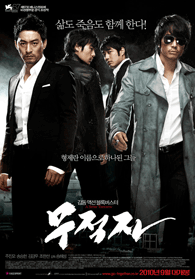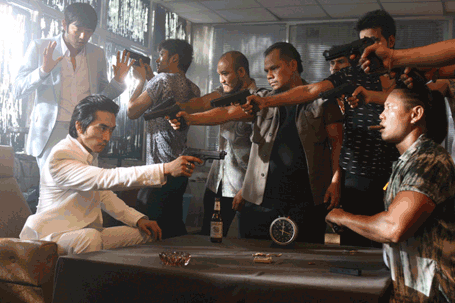
As I said before, generally it stands as a good rule of thumb that remakes of great films can’t be that good, because if they were that great, why would they be capable of being remade well? And again, for the most part that holds true in director Song Hye Sung’s remake of John Woo’s iconic film. This is all in spite of how competent Song Hye Sung is as a director: a few years ago his superbly controlled, slow-burning and lyrical melodrama Failan, about a low-level mobster’s redemption by the love of his mail-order bride he has never met, was instantly acclaimed as a masterpiece.
Here that sense of control and restraint, sharply contrasted with sharp, slick action sequences, informs his remake. The plot in large part follows the original: two brothers, this time both refugees from North Korea (whereas in the original they both led comfortable middle class lives), end up on different sides of the law once they reach the South. The elder brother, Kim Hyuk (Joo Jin Mo), while a comfortably affluent gangster, feels guilty over how he left his mother and brother at the border, during which his own mother was killed by the North Korean authorities. The younger brother, Kim Chul (Kim Kang Woo) ends up as a cop who is angry over his brother’s perceived betrayal. Meanwhile, a botched deal in Thailand turns out to be a set up for Kim Hyuk, who is then imprisoned for three years. When he re-emerges, the lackey who betrayed him, Jung Tae Min (Jo Han Seon), is now a feared crime boss, and his former best friend, Lee Young-Choon (Song Seung Heon, in the iconic role made famous by Chow Yun Fat) is now reduced to a car washer.
While the melodrama is competently written and crisply delivered, it’s in the heartware that this film lags behind the Hong Kong original. The Hong Kong original, despite its earned reputation as a groundbreakingly violent film, is above all a tender, warmhearted story with a heart-on-sleeve earnestness about its message of rehabilitating convicts into society, and some surprising moments of levity in the form of slapstick pratfalls. Hong Kong stars may have earned their reputation by being action men, but in their prime they were also funny and emotional. In place of the message of rehabilitating convicts, the Korean remake tries to throw a spotlight on the illegal immigrant refugee problem worldwide, be it from North Korea or the Golden Triangle, but it fails to have much resonance or depth in its treatment of the problem. The actors are competent performers, but the stern and stoic countenances of Korean action men are far less dramatically appealing than their Hong Kong brethren.












 打印版本
打印版本









